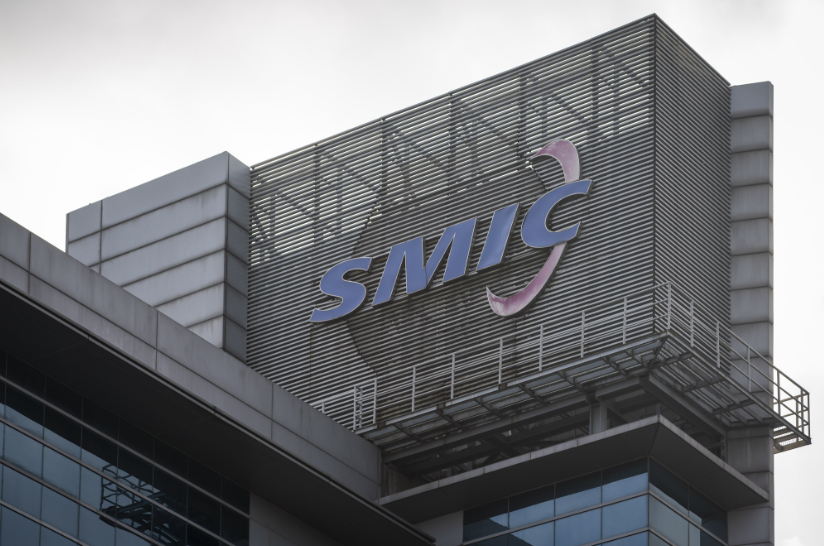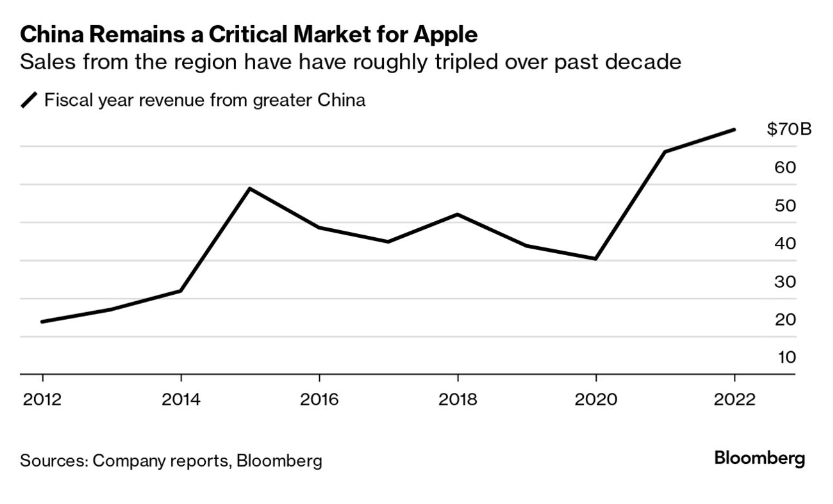A Huawei Mate 60 Pro smartphone. Photographer: James Park/Bloomberg
本篇主要由百度翻译完成,Jingyi 作微调工作。
译文
大家好,我是 Allen Wan,在上海写这篇稿子。
华为正在卷土重来。这家中国巨头公司,用他们最新版手机取得了重大胜利,引发一系列恐慌的猜测(sparking a flurry of speculation over ...),即北京最终是否朝向遏制美国野心的方向发展,这野心也包含了他们的技术抱负。
这似乎确实事实,当我们参与华为最新 MATE 60 PRO 时候(未知是生产还是发布),发现 5G 速度堪比最新版的 iPhone。时间是如何改变一家公司的,这家公司主营业务被美国禁止与其合作(的决议)严重冲击。
注:
1.That certainly seemed to be the case when we took part Huawei's new Mate 60 Pro, ... 当我们参与华为 MATE 60 的时候,这似乎是事实,……
Huawei is making a comeback. 华为正在卷土重来。
目前尚不清楚华为是如何实现这一突破的。SK Hynix 正在调查其芯片在 Mate 60 中的使用情况,因为这家韩国公司坚称严格遵守美国的出口管制。在我的同事 Vlad Savov 和 Debby Wu 委托撤销后(注意:译者理解,),美国立法者也在电话中异常兴奋。
注:
1.It is not clear that ... 目前尚不清楚 …
2.up in arms over the phone in the wake the teardown commissioned by …
我曾暗示华为计划重返技术竞赛。上个月,在我的美国同事得到消息后(got a tip),我南下前往华为总部所在地深圳,该公司在300亿美元的国家资金帮助下,至少收购了两家工厂,并正在建造三家工厂。
我到达该地区的那个炎热闷热的星期天一直在下雨,我犯了一个错误,没有穿橡胶套鞋(rubber galoshes)去第一个工地。当我在一英里长的公共道路上跋涉时,我一边收集信息,一边穿着运动鞋沾着泥浆。虽然我没能进入芯片制造厂的归零地(Ground Zero),但我仍然可以从附近的一排食品摊位上看到一切。
我参观的一家工厂位于芯片制造商的天堂,有一个名为“半导体公园”的空间和一辆未来派轻轨电车(light-rail tram)。它也位于中芯国际的一个主要办公室的街对面。中芯国际(SMIC)是中国顶级芯片制造商,为 Mate 60 提供了最新技术,即 7nm 处理器。

SMIC signage atop the company's headquarters in Shanghai. Photographer: Qilai Shen/Bloomberg
当然,考虑到对中国的制裁,这是令人印象深刻和大开眼界的,但该国要与世界技术领导者竞争还有很长的路要走。
总部位于北京的咨询公司 Trivium 的副董事 Tom Nunlist 表示:“下一个芯片节点突破的障碍可能要高得多。”他强调,开发商用 7nm 芯片并不意味着中国可以轻易迈出下一步。
注:
1.doesn't mean China can easily take the next step 并不意味着中国可以轻易迈出下一步
即便如此,MATE 60 发布的消息吸引众多人注意,由于这暗示着中国投入的几十亿美元的努力,来发展自给自足的技术,然而这一模式已然看到了结果(are bearing fruit)。中国试图在其AI优势下走得更远,以及其他高新技术领域重新点燃经济。
华为的成功也对苹果等大型跨国公司构成了威胁。iPhone 约五分之一的销售额来自中国,并且已经面临着政府计划扩大禁令范围(的局面),在国家支持的公司和机构内部。

这意味着华盛顿对中国科技行业的限制可能没有我们想象的那么有效。美国政府正试图确定华为芯片进展的全部细节,国家安全顾问 Jake Sullivan 本周表示,当局正在寻找有关处理器组件的更多信息。
注:
1.not be as effective as we all thought 可能没我们想象的那么有效
2.Huawei's chip advance 关于华为的芯片进展
3.National Security Advisor 国家安全顾问
4.the processor's composition 处理器组件
Nunlist说:“芯片技术出口管制可能是华盛顿在技术战争中唯一的王牌,这似乎让中国比以往任何时候都更加坚定。”。“需要是发明之母,美国为中国创造了很多需要。”
注:
1.chip tech export controls 芯片出口管制
2.doggedly determined than ever 比以往任何时候都更加坚定
一些人怀疑,再次升级美中科技之战是否值得麻烦。彭博资讯专栏作家Howard Chua Ewan表示,华盛顿可以随时收紧制裁制度,加强保障措施,以减缓核扩散,但商业几乎总是会泄露技术秘密。
注:
1.some wonder whether ... 有些人怀疑
2.tighten its sanctions regimes and strengthen the safeguards to slow the proliferation 随时收紧制裁制度,加强保障措施,以减缓核扩散
3.force out technological secrets 泄露技术秘密
“如果中国和美国继续利用贸易和技术进行统治世界的零和游戏,我们都有可能最终陷入徒劳无功。”
注:
1.end up on the zero end of the equation 徒劳无功
原文
Hello, this is Allen Wan in Shanghai.
Huawei’s making a comeback. The Chinese tech firm appears to have scored a major win with its latest smartphone, sparking a flurry of speculation over whether Beijing is finally making some headway in circumventing US attempts to contain its tech ambitions.
That certainly seemed to be the case when we took apart Huawei’s new Mate 60 Pro, finding it capable of 5G speeds seen in devices like the latest iPhones. How times have changed for a company whose dominant smartphone business was hit hard by US prohibitions on working with American companies.
It’s not clear how Huawei was able to achieve this breakthrough. SK Hynix is investigating the use of its chips in the Mate 60, given the South Korean company insists it strictly abides by US export controls. American lawmakers are also up in arms over the phone in the wake of the teardown commissioned by my colleagues Vlad Savov and Debby Wu.
I had hints that Huawei was planning to get back into the technology race. Last month I took a trip down south to Shenzhen — where Huawei is headquartered — after my US colleagues got a tip the company had acquired at least two plants and was building perhaps three more with the aid of $30 billion in state funding.
It had been raining on the hot and muggy Sunday I arrived in the region, and I made the mistake of not wearing rubber galoshes to the first construction site. As I trudged up a mile-long public road, I gathered information while my sneakers were collecting mud. While I wasn’t able to enter Ground Zero of the chip fabrication plant, I could still see everything from a nearby strip of food stalls.
One factory I visited was located in a sort of chipmaker haven, with a space named “Semiconductor Park” and a futuristic light-rail tram. It was also located across the street from a major office for SMIC — the top Chinese chipmaker that provided the Mate 60 with its latest tech, a 7-nanometer processor.
“The barrier to the next chip node breakthrough is likely quite a bit higher,” said Tom Nunlist, an associate director from the Beijing-based consulting firm Trivium, who stressed that developing a commercial 7nm chip doesn’t mean China can easily take the next step.
Even so, the Mate 60 news is turning so many heads because it suggests President Xi Jinping’s multibillion-dollar efforts to develop technological self-sufficiency are bearing fruit. China wants to expedite its advances in AI and other high-tech areas to reinvigorate its economy, which Bloomberg Economics now projects may never confidently overtake the US.
Huawei’s success also poses a threat to big multinationals like Apple. The iPhone maker derives about a fifth of its sales from China, and is already facing a blow from the government’s plan to expand a ban on the use of iPhones within state-backed firms and agencies.
And there’s the implication that Washington’s curbs on China’s technology sector may not be as effective as we all thought. The US government is trying to establish the full details of Huawei’s chip advances, with National Security Advisor Jake Sullivan saying this week that authorities are looking for more information about the processor’s composition.
“Chip tech export controls may have been Washington’s one and only ace in the tech war, and it seems to have made China more doggedly determined than ever,” Nunlist said. “Necessity is the mother of invention, and the US has created a whole lot of necessity for China.”
Some wonder whether escalating the US-China tech battle again is even worth the trouble. Washington can always tighten its sanctions regimes and strengthen the safeguards to slow the proliferation, said Bloomberg Opinion columnist Howard Chua-Eoan, but commerce will almost always force out technological secrets.
“If China and the US continue to use trade and technology in a zero-sum game of world domination, we are all likely to end up on the zero end of the equation.”
